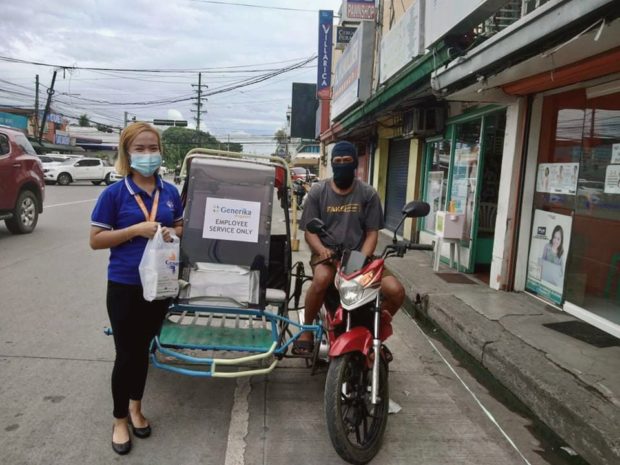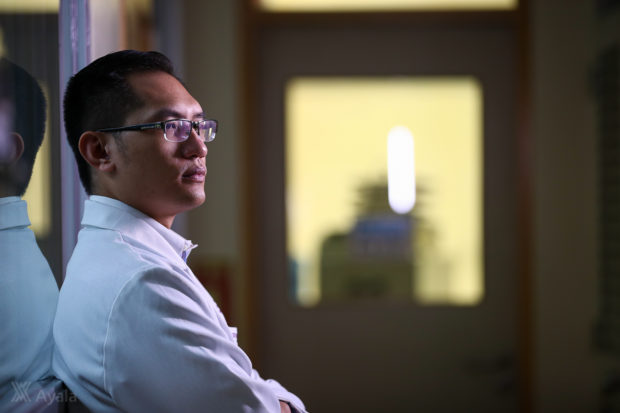Ayala Group of Companies shares stories of modern heroes on National Heroes Day
“A hero is born among a hundred,” a famous philosopher once said. But today, as we face one of the biggest challenges of the century, many of us have stepped up to become heroes in our own right—delivering essential services, ensuring people’s safety, saving lives.
On National Heroes Day, the Ayala Group of Companies gives a voice to these unsung heroes by chronicling their stories on chronicle2020.ayala.com. Here are stories of Filipino essential workers who went beyond eight-to-five to serve the people.
A HEROINE ON A TRICYCLE
Generika pharmacy assistant Sheena Gallego goes out of her way to bring medicines to her customers
Sheena Gallego was running out of songs to play, and it was only 8 o’clock in the morning. The 27-year-old pharmacy assistant had been standing for an hour at the bus terminal, waiting for the “libreng sakay” for frontliners that would bring her to the Generika branch in La Paz, Iloilo City.
Her ‘90s music playlist calmed her down and eased the boredom of the long wait. But that wasn’t the only “soundtrack” of her new normal. Her days as a frontliner hummed to the tune of Alan Menken and… the tricycle engine.
Article continues after this advertisement
Sheena Gallego, pharmacy assistant at Generika branch in La Paz, Iloilo City
A small but important role
Article continues after this advertisementSheena couldn’t miss a day of work—not because she needed the pay, but because her customers needed her.
She fully understood the crucial role of drugstores in decongesting hospitals during the pandemic. People with mild diseases were advised to self-medicate and monitor their symptoms at home. The neighborhood pharmacist was their closest and most accessible health practitioner.
“Kailangan kong pumasok at matugunan ‘yung medicine needs ng mga tao. Kaya kahit mahirap ang transportation, talagang pumapasok ako para magbukas ng store,” she said.
A special heart for senior citizens
Sheena knew that some of her most important customers, the senior citizens, couldn’t even go to the pharmacy.
Her own parents were senior citizens. She was their caregiver; her sister, who works in Dubai, entrusted her with managing the household.
That’s why she knew the plight of senior citizens, especially those who lived alone.
“Kung hindi sila makakalabas ng bahay, paano ang mga needs nila like maintenance medicine?” she said, adding that her parents considered themselves lucky for having a daughter who worked at a pharmacy and could easily get them the medicines and supplements they needed.
However, there were many senior citizens who had no family and no transportation. They needed their medicines to stay healthy, but going out could also expose them to the dangerous virus.
Some heroes don’t have capes — just tricycles
Sheena volunteered to deliver medicines to their senior citizen clients so they wouldn’t have to leave their homes. Thankfully, the Generika branch in La Paz supported this idea and hired a tricycle to help her roam around the city.
“As a healthcare worker, I have the privilege to go around, kaya ginamit ko iyon to serve clients [who couldn’t go out during the lockdown].”
And clients have been very appreciative. “Thankful po ako dahil ‘di na po namin kailangan lumabas para bumili ng gamot. Generika Drugstore lang po ang nag-offer ng home delivery of medicines. Malaking tulong sa amin ‘yung serbisiyo nila,” said Ninfa Camacho, a senior citizen customer.
Sheena added that some clients even cooked for them and gave them merienda packs to show their gratitude. “Makikita mo sa mga mata nila na happy sila at na-appreciate nila ‘yung extra effort mo,” she added.
Discovering new, affordable alternatives
But beyond delivering medicines, Sheena said their biggest accomplishment is how they were able to change people’s perception of generic medicines.
Some clients had strong brand loyalty. But when certain brands of medicines ran out of stock during the lockdown, many approached Sheena and the Generika team for affordable, good quality unbranded alternatives.
“Minsan ang mga tao, ang alam nila iisang gamot lang. Parte ng trabaho kong matulungan sila by giving them alternatives,” she said. “Sobrang thankful nila sa kaalaman na na-share mo.”
This, according to Sheena, continues to be their mission in Generika: to make medicine more accessible and affordable — whether it’s offering important information, affordable alternatives, or delivering medicines by tricycle in the middle of a pandemic.
That is the music that keeps her going.
FIND THE ENEMY
Anthony Geronimo and his team at the Tropical Disease Foundation convert a tuberculosis research lab into a COVID-19 testing facility for Ayala employees
“Nandoon yung pressure,” says Anthony Geronimo, laboratory administrator of the Tropical Disease Foundation (TDF) in Makati. “There was no room for error kasi umabot na sa taas, eh—sa taas ng company namin, sa taas ng Ayala, so pangalan namin yun nakataya, at parang pangalan ko na rin yun nakataya. Siempre, ayaw din namin mag-fail talaga, because this was an opportunity to get involved in COVID-19 and to help.”
Anthony is remembering the Zoom meeting last April 16 where the partnership was first established between Ayala Corporation and TDF—the 36-year-old private, non-stock, non-profit organization providing research, training, and laboratory services to fight infectious diseases—to conduct COVID testing of Ayala employees.
Virtually present were Ayala Corporation chairman and chief executive officer (CEO) Jaime Zobel de Ayala and his team, including AC Health chairman and CEO Paolo Borromeo and Ayala Corporation chief human resource officer JP Orbeta. TDF was represented by president Dr. Roberta Romero, vice president for programs Lani Naval, and chairman of the board Dr. Ruben Encarnacion.
Anthony learned more about the two entities’ shared history, which started when Ayala donated the land that TDF stands on in Pio del Pilar, Makati. “It was like a meet-and-greet, but I felt that the top management of Ayala Corporation really wanted to get this done,” he says.
Groundwork
The groundwork had actually been laid weeks earlier, when, anticipating a return to work after the lockdown and quarantine in the National Capital Region, Ayala Corporation decided that its employees needed to be tested, at their own testing center. A rapid test would be administered, and a positive result would lead to a reverse transcription polymerase chain reaction (RT-PCR) test, considered the definitive indicator of infection. Earlier this year, no institutions other than the Research Institute for Tropical Medicine (RITM) were conducting such tests.
Instead of setting up laboratories from scratch, AC Health opted to tap TDF, originally a tuberculosis (TB) research lab that had been built with funding from international donors. Less than a month after that meeting, Ayala had provided for additional machines and people, as TDF could not use their TB equipment. In short, a dedicated COVID laboratory of sorts was established within the building, with Anthony and other senior staff undergoing special training at RITM to handle the new virus.
Five people in the laboratory handle the samples. “You need a minimum of three people working inside to complete the process,” Anthony says. “So now, we receive approximately 10 to 15 samples per day.” TDF also works with Healthway, the network of mall-based clinics also owned by AC Health, which takes care of swabbing patients and sending over the samples.
Anthony and his staff prepared for the responsibility by building competence and capacity in the first few weeks. “Ayaw naman namin na sumugod agad, tapos papadalhan kami ng 100, tapos magkaka-delay,” says Anthony. “Ang takot namin yung maba-backlog o ma-contaminate yung process, so ayaw namin yung mabilisan.” For now, some 32 tests are processed a day [as of this writing, June 12, 2020], but TDF is working on speeding up the process.
Anthony walks laymen through the procedure, which begins with receiving the samples. “Once we receive it, of course we need to verify the data and the labels. Ayaw natin magkaroon ng maling report, di ba? Baka yung pasyente mong negative, ma-report mo as positive kung napagpalit mo yung samples. So doon pa lang, dalawang tao na ang gumagawa.”
The samples are received from the courier and brought into the laboratory, Anthony continues, where a staff member awaits. The samples are carefully opened inside a sterile cabinet, in case of leak and contamination. Labels, documents, seals, even name spellings are checked and double-checked. Late arrivals are stored in the refrigerator, to be processed the following morning.

Anthony Geronimo, laboratory administrator of the Tropical Disease Foundation (TDF)
Genetic makeup
Inside the coronavirus molecule, Geronimo explains, is the ribonucleic acid (RNA) that determines its genetic make-up; this is what the laboratory team extracts and purifies. It will take up to five hours to perform RNA extraction on some 30 samples.
The next step, master remix preparation, entails adding a “primer” of chemicals to make the RNA multiply, so the presence of the virus can be better detected. This is also done under sterile, cold conditions to prevent contamination. “Para kang naliligo sa alcohol palagi,” observes Anthony.
After mixing for around 20 minutes, the material is taken to the PCR machine, which resembles a microwave oven with test tube holders inside. At the end of the process, there will be millions of copies of the RNA, and fluorescence is an indicator or the presence of the virus.
Anthony refers to “certain parameters” that must be satisfied. Laboratory staff look for patterns in the resulting graphs that determine a minimum threshold, and even then the cycles are examined repeatedly before concluding that a sample is positive.
Anthony volunteered to be the first patient tested at TDF after the staff training at RITM. Although he was anxious about the result, “Honestly, I was also very excited,” he admits, “because for a lab person, it was new, and you realize you can already help in detecting COVID, you can help the government, you can help other people. We said, ‘This is it. There’s no turning back.’”
After working hours, Anthony, who has a wife and a toddler at home, shifts to driver mode, dropping off co-workers as far from his Cubao home as Novaliches and Makati. What keeps him going, he says, is seeing how hard his staff works. “Naglalatag sila sa floor para lang makatulog. So wala rin akong karapatan magreklamo na pagod ako.”
“Pero ang pinaka-nagpu-push sa akin para magtuloy-tuloy is, gusto na natin talaga matapos itong COVID,” Anthony says. “We need to do our part if we want to end this pandemic. At kahit gaano ka-init yun sinusuot namin, kahit gaanong nakakangalay yung process namin, at the end of the day, meron kang isang mapapangiti pag negative yung resulta niya.”
Read more stories of quiet heroism on chronicle2020.ayala.com
ADVT